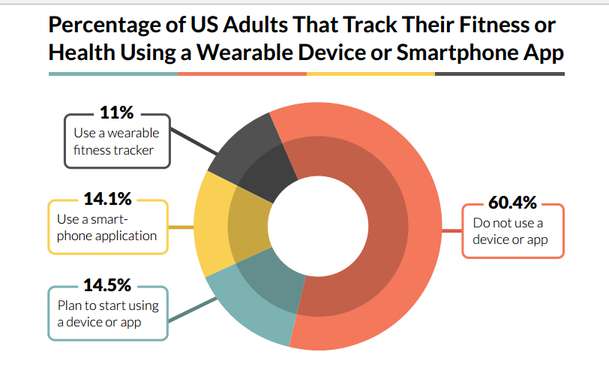
Have the skeptics won?

Late last month, TechnologyAdvice released an interesting study looking at whether most people want to use health wearables such as fitness trackers and other tools for health purposes.
Here are the top-line results of this study:
– 75 percent of U.S. adults do not track their weight, diet, or exercise using a health tracking apps or devices
– 43.7 percent had no specific reason for not tracking their fitness
– 27.2 percent won’t use these devices due to lack of interest
– 25.1 percent of adults are currently using either a fitness tracker or a smartphone app to monitor their health, weight, or exercise.
This sounds like pretty bad news for those who believe the era of health wearables is here. But, this study also raises another question: Are health wearables evangelists fools?
Fierce Mobile Healthcare may think so. In its coverage of this research, it said this study “seems to contradict recent data that claims 100 million mHealth wearable monitor devices are expected to be shipping by the year 2020.”
Game over right? Not quite.
Here’s the Secret to Getting People to Use Health Wearables
The secret to getting people to use health wearables is staring us right in the face — if we take time to look. And, some of the people at companies creating wearable devices know this secret and are planning on using this knowledge to their advantage.
Would you like in on this secret?
It all comes down to one word: relevance. People are much more willing to use wearables if they are relevant to them.
Let me explain using some data collected by my firm Enspektos and the TechnologyAdvice study.
1. Save People Money and They’ll Use Wearable Devices for Health
People care about money. So much so that they will change their behavior to earn or save it — at least in the short term. That’s why it’s not surprising that the majority of Americans told TechnologyAdvice that they’d be willing to use a fitness device if it lowered their health insurance premiums. Money is relevant to people. A money-saving wearable device is a highly relevant product.
2. People Who Value Health Tech That’s Relevant Will Use Wearable Devices
Here’s another data point that speaks to the power of relevance. In a study conducted with ePatients (or digitally active health consumers) late last year, we looked at whether they valued using health technology that was relevant to them, i.e., it:
– Fit within their lifestyles (aligned with things they were already doing)
– Reflected or matched their background/culture/preferences, etc.
After the TechnologyAdvice study came out, I took a look at whether those who valued highly relevant health tech would be more likely to use wearable devices for health. The results are clear (see the image below).

ePatients who value using relevant health tech are 4.5 times more likely to say they would be willing to use health wearables.
3. The Bottom Line: It’s Not About How Many, But Who and Why
I’ll leave you with one more thought. Which question do you think companies like Jawbone, Fitbit, Google and Misfit are interested in answering?
– How many people will use wearables overall?
– How to get more people to use their devices?
I think the answer is obvious. The real secret to boosting the adoption of health wearables is relevance.
If this article was highly relevant to you, please contact me. I’d be happy to chat about the importance of relevance in digital health (and more).
Related: The Apple Watch & Digital Health: 3 Must Ask Questions
Fard Johnmar is a digital health futurist, researcher and co-author of the #1 bestselling book, ePatient 2015: 15 Surprising Trends Changing Health Care. He is also founder of Enspektos, LLC, a globally respected innovation consultancy providing original research, strategy, analytics and more to health executives, organizations and others.
